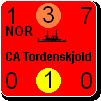GoodGuy
Posts: 1506
Joined: 5/17/2006
From: Cologne, Germany
Status: offline

|
quote:
ORIGINAL: Murat
The laws that are relevant here are not the US laws (actually US treaties are relevant, which are "laws" of the US but not in the strict sense), they are the laws of the nation where the CONSUMER resides since it is the CONSUMER who owes the tax, the corporation is only in charge of collecting the tax. So why would a US company want to collect the tax? Because they are doing business in the consumer's nation and want to continue to do so. If they refuse to collect the tax, at some point the government of the consumer's nation can go after the corporation for evading the taxes and fine them, often in vast multiples of the original tax and then enforce those judgments through the treaties they hold with the US. In extreme circumstances they can place an embargo on the goods from that company or find the principle officers of that company to be in violation of criminal laws and incarcerate them....
Well, embargo? Well, the EU never placed an embargo on US software products, afaik. What they did was that they threatened to introduce (I am not sure whether that was ever put into effect) import taxes on say INTEL hardware products, for example, or on PCs (Intel, Dell, etc., everything containing INTEL chips) assembled in or shipped from the US, or on Microsoft products, for several reasons, where the next step (in this threat) could have been a possible ban of some US products. The issues had been resolved through negotiations, usually. Part of the issue back then with INTEL was Intel's market leadership and/or their actions to help suppress the competition, same with Microsoft.
And an embargo for a company of Matrix' size .... no further comment.
quote:
, extraditing them under treaties. EDIT well there you go, Matrix is UK and EU as well as US, they have to deal with all 3 legally.
As far as I know, the US have not agreed to/signed any treaty that puts domestic businesses at a major disadvantage (EU businesses are allowed to export to non-EU countries tax-free).
Also, a separate US business is in NO way bound to EU jurisdiction, the EU can come up with all kinds of new impertinent attempts to pester US businesses and to bolster EU sales to the US and other countries, but that will not change. The "Matrix department" in the UK is most likely Slitherine. So, question is whether Matrix really has to be a "Ltd" (which usually means that its HQ and main branch is registered in the UK). If Matrix does that for tax reasons or practical reasons, then why not form a US branch for digital exports only, which doesn't have to succumb to the EU's policy to disadvantage US businesses? I think "customer satisfaction reasons" (uh, I coined a new word  ) are not to be disregarded by Matrix. ) are not to be disregarded by Matrix.
Then let the customer decide whether he wants to pay VAT or not, as the decision will then be in his domain.
quote:
But some US companies do not charge VAT. That is because they are set up so that you make your purchase in the US, probably in a state that will not charge a sales tax for an out of state purchase....
If I am not mistaken, most US states - if not all - either won't charge for export sales, or they will have a greatly reduced tax, as product delivery (be it electronically or physically) to foreign residents (even IN the US, let alone outside the US) qualifies as EXPORT.
US businesses, who follow the EU demands regarding VAT, only do that because they are concerned that EU authorities may put some punishment on their business. This usually turns out to be unfounded if it comes to a Niche business like Matrix. It shouldn't be too hard to find a legal and satisfying (for EU customers) form of business registration for that, anyway, imho.
quote:
Developers here accept a low return on their time investment because they make games they love and want to play. Even with that low return, due to economies of scale they need to charge more than a Paradox does.
That actually is related to the low sales numbers (compared to the majors) and the fact that wargaming is a Niche-market.
According to market laws, it's not wise to charge well above the average market price for a longer time. While I enjoy playing Matrix games (maybe except for CAW, due to the lack of content), I don't know if I, as a customer, want to be held liable for the chance that a given developer cannot make a living with such low sales numbers. It should then be in the distributor's interest (and it should be his job) to try and push sales. With the Matrix brand, there are still many people all over the world who never heard about Matrix, and who - even tho they're interested in wargaming - would never find or go to the Matrix website, be it a language problem (say potential French, German or Spanish speaking customers) or just lack of marketing. There are quite some inexpensive marketing efforts, too.
There is still a debate whether putting down the prices down to a bargain rate (and cooperating with distributors like Steam or - maybe less bossy/intrusive - say Direct2Drive) after say a year or 2 (even if for a short time only) will enhance the customer base/player base or not. I'd say it would have potential to create a big booster effect, though. Think about the bargain sales on D2D... I'd never have bought a Paradox game, if it would have cost me more than 9 bucks.... the one I got is so buggy and unfinished, it's unbelievable. And, besides the potential to get more wargaming folks to the bright side (Matrix), casual gamers (non-grognards) may actually pick up some games, if they are available on a well-known platform outside the Matrix domain.
< Message edited by GoodGuy -- 10/11/2011 8:34:46 PM >
_____________________________
"Aw Nuts"
General Anthony McAuliffe
December 22nd, 1944
Bastogne
---
"I've always felt that the AA (Alied Assault engine) had the potential to be [....] big."
Tim Stone
8th of August, 2006
|
 Printable Version
Printable Version

















 . I'd suggest Matrix consider selling some more mass appeal games like Panzer Corps on Steam instead, if only as an experiment, but its your business obviously. Wish you the best either way, PC gaming wouldn't be the same without its niches.
. I'd suggest Matrix consider selling some more mass appeal games like Panzer Corps on Steam instead, if only as an experiment, but its your business obviously. Wish you the best either way, PC gaming wouldn't be the same without its niches. 

 ) are not to be disregarded by Matrix.
) are not to be disregarded by Matrix. 
 New Messages
New Messages No New Messages
No New Messages Hot Topic w/ New Messages
Hot Topic w/ New Messages Hot Topic w/o New Messages
Hot Topic w/o New Messages Locked w/ New Messages
Locked w/ New Messages Locked w/o New Messages
Locked w/o New Messages Post New Thread
Post New Thread